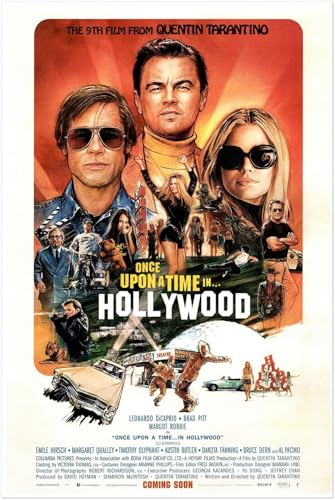Quentin Tarantino isn’t just a master behind the camera; he’s also a shrewd business owner with a keen eye for ventures that complement his cinematic style. From silver screens to vinyl spins, Tarantino’s entrepreneurial spirit is as eclectic as his filmography.

While he’s best known for directing cult classics, Tarantino’s business portfolio reveals a different side of his creativity. Fans might be surprised to learn about the establishments he’s got his fingerprints on. Let’s dive into the world of Tarantino’s lesser-known roles: businessman and proprietor.
Quentin Tarantino’s Business Ventures
Beyond the silver screen, Quentin Tarantino has extended his artistry into the world of business with flair and a touch of the same storytelling magic that’s become his signature. Whether it’s connecting with crowds through film or engaging with fans through other types of ventures, Tarantino’s business acumen shines through just as brightly as his direction in cult classics.
One of his most famous commercial exploits is the acquisition of the New Beverly Cinema in Los Angeles. This iconic establishment is not just a theater; it’s a mecca for cinephiles, offering a vintage movie-going experience that rivals the comfort of modern multiplexes. Tarantino’s involvement ensures a carefully curated selection of films that reflects his passion for the art of cinema and dedication to film heritage.
Furthering his footprint in the leisure and hospitality industry, Tarantino has also put his mark on the world of literature. The auteur ventured into the publishing scene with a novelized version of “Once Upon a Time in Hollywood”. The venture expanded his storytelling horizons and offered fans a different medium to enjoy his cinematic universe.
Delving into the music realm, Tarantino holds a stake in the record company A Band Apart Records, which complements his love for film soundtracks and allows him to influence the music that so often defines his films’ atmospheres. This business endeavor keeps him at the intersection of sound and vision, where he’s crafted some of the most memorable scenes in modern cinema.
Tarantino’s business forays paint a picture of a creator who isn’t content with staying within the confines of one industry. Instead, he transports his unique style and vision into various markets, captivating audiences no matter the platform. His ventures serve as extensions of his creative expression, showing that for Tarantino, art and business are inextricably linked.
The New Beverly Cinema
In the heart of Los Angeles, the New Beverly Cinema stands as a beacon of film preservation and appreciation, an endeavor close to Tarantino’s heart. Originally opened in the 1920s, it’s been operating as a cinema since 1950, and Quentin Tarantino became the savior of this beloved institution in 2007, choosing to preserve its legacy rather than let it succumb to modern pressures. This historic venue isn’t just another movie theater; it’s Tarantino’s commitment to the golden era of film, showcased through his carefully curated selection of 35mm and 16mm celluloid.
Tarantino’s ownership of the New Beverly Cinema enables a unique cinematic experience. Patrons aren’t just going to watch a movie; they’re stepping into an ambiance filled with nostalgia. Tarantino often programs double features, allowing audiences to immerse themselves in back-to-back stories much like the viewing experiences of the past.
« What Businesses Does Scott Adams Own? Exploring the Dilbert Creator’s Ventures
What Businesses Does Shannon Sharpe Own? Unveil His Empire’s Scope »
The esteemed director’s involvement goes beyond mere ownership. He’s deeply involved in the selection of films, often choosing from his own private collection, ensuring that each screening is more than a simple projection. It’s a presentation of his personal affinity for film history and quality, providing a platform for cinemagoers to explore everything from cult classics to forgotten gems.
Beyond programming, Tarantino’s dedication has been instrumental in keeping the 35mm film alive and accessible. By exhibiting movies exclusively in 35mm since 2014, the New Beverly offers a rare opportunity to see films in their original format, upholding a traditional film experience that’s becoming increasingly rare in the digital age.
During screenings, one might also encounter unique touches such as original vintage trailers and a ban on any pre-show digital advertising, which reaffirms the theater’s commitment to a pure, retro movie-going experience. The New Beverly Cinema represents not just Tarantino’s business acumen but also his love letter to a bygone era, providing an escape into the world of classics for every patron who walks through its doors.
Tarantino’s Rolling Thunder Pictures
In the realm of boutique home video, Quentin Tarantino’s entrepreneurial ventures took a turn with the inception of Rolling Thunder Pictures. Established in 1995, this company was Tarantino’s tribute to the niche but beloved films that profoundly influenced his own directorial style. Rolling Thunder Pictures targeted cinephiles with a proclivity for the unconventional, resurrecting obscured titles for a second chance in the limelight.
Rolling Thunder Pictures unearthed cinematic gems, giving them a grand re-introduction to audiences often through limited theatrical releases. This venture was not just a commercial move but stemmed from Tarantino’s fervor to share his personal cinematic discoveries. The company’s brand resonated with Tarantino’s reputation for deep cuts and eclectic taste, spanning genres and eras without discrimination.
With this boutique label, films like “Chungking Express” and “Switchblade Sisters” were restored and showcased. The work that Rolling Thunder Pictures did was akin to a curator meticulously selecting pieces for an exhibit, with Tarantino’s expert filmmaking eye guiding the selection process. These restorations weren’t merely for profit – they served as a beacon for the type of cinema that Tarantino himself adored and wished to keep alive in the hearts of film enthusiasts.
The business model was as unique as the films it represented, with Tarantino’s company often partnering with Miramax to distribute these films. Through these collaborations, the enterprise underscored Tarantino’s commitment to films that shape cinema’s fabric. The efforts by Rolling Thunder Pictures enriched the moviegoing scene by including discussions, special events, and even Quentin’s own introductions for select screenings—another layer to the interactive and highly personal film consumer experience that Tarantino championed.
While Rolling Thunder Pictures may not have had the longevity of some of Tarantino’s other outings, its contribution to the film industry and to preserving Tarantino’s brand of cinema culture remains monumental.
Tarantino’s Publishing Endeavors
Quentin Tarantino, a name synonymous with cult classic films, has expanded his empire into the realm of publishing with a flair only he could muster. It’s not just any publication venture; Quentin’s passion for storytelling transcends the silver screen and finds a new home in the pages of books.
In a move that aligns perfectly with his artistic sentiments, Tarantino transformed his film “Once Upon a Time in Hollywood” into a mesmerizing novel. This form of transmedia storytelling isn’t just about reaching a wider audience – it’s a testament to his dedication to the craft. The book serves as an extension of the movie, offering readers a deeper dive into the rich, alternative universe that Tarantino is famed for creating.
The novelization of “Once Upon a Time in Hollywood” marks the director’s debut as a published author, but he’s certainly not stopping there. HarperCollins struck a two-book deal with Tarantino, promising fans more literary ventures from the acclaimed filmmaker. His second work, a work of nonfiction, delves into the cinema that shaped his childhood and the film industry at large. It’s an intimate look at the influences that molded a young Quentin into the iconic director he is today.
Tarantino’s foray into publishing isn’t just about nostalgia or brand extension; it’s a strategic move to cement his place in not just cinematic, but also literary history. By branching out into the world of books, Tarantino isn’t just preserving his work; he’s ensuring that Tarantino’s brand of narrative and dialogue can be savored in print as well as on the screen.
The impact of these publishing endeavors on Tarantino’s brand cannot be overstated. They allow him to showcase his versatility and maintain creative control over his work in different media. With his distinctive voice now in print, Tarantino continues to shape culture, both on and off the screen.
Tarantino’s Music Label
Quentin Tarantino’s business ventures extend beyond the silver screen and the pages of novels. His music label, A Band Apart Records, reverberates with the same eclectic and immersive storytelling found in his films. The label not only serves as a vessel for the iconic soundtracks from his movies but also curates a collection of music that aligns with Tarantino’s unique auditory tastes.
Each album released under A Band Apart Records is a testament to the director’s famed ability to fuse visuals with soundtracks seamlessly. A shining example is the “Kill Bill” soundtrack, which achieved critical acclaim and became as much a cultural symbol as the film itself. The success of such soundtracks underscores Tarantino’s knack for selecting music that not only complements his cinematic vision but also stands alone as a powerful musical narrative.
Going beyond the confines of his own films, the label’s scope includes promoting new artists that resonate with the Tarantino aesthetic, a blend of the retro, the modern, and the timeless. The music that emanates from this label continues to push boundaries, just like Tarantino’s films often do.
The synergistic relationship between Tarantino’s cinematic endeavors and his music label is emblematic of his dedication to create a holistic experience for his audience. A visit to A Band Apart Records is like stepping into a scene from one of his storied creations—with each record offering a taste of the Tarantino universe through an auditory lens. It’s a venture that, much like his films, transcends the traditional boundaries of its medium, appealing to audiophiles and cinephiles alike.
Conclusion
Quentin Tarantino’s ventures into publishing and music aren’t just a nod to his artistic inclinations but a masterful expansion of his storytelling canvas. With each step, he’s not only diversifying his portfolio but also enriching the cultural landscape. His novel and upcoming nonfiction book promise to offer fans a deeper dive into the mind of a filmmaker who has already left an indelible mark on cinema. Meanwhile, A Band Apart Records continues to echo his distinct style, bringing a piece of Tarantino’s cinematic world to music lovers everywhere. It’s clear that whatever business Tarantino touches, he brings with him a flair for the creative and an unwavering commitment to his craft.
Frequently Asked Questions
What is Quentin Tarantino’s latest venture?
Quentin Tarantino has expanded into the realm of publishing, writing novels and nonfiction books about cinema.
Which Quentin Tarantino movie recently became a novel?
Tarantino novelized his film “Once Upon a Time in Hollywood” as part of his publishing endeavors.
What is Tarantino’s upcoming book about?
Tarantino’s upcoming nonfiction book will explore the cinema that shaped his childhood and influenced his work.
How does Tarantino’s move into publishing affect his legacy?
Tarantino’s publishing efforts allow him to cement his place in both cinematic and literary history, showcasing his storytelling versatility.
What is A Band Apart Records?
A Band Apart Records is Quentin Tarantino’s music label, which releases film soundtracks and curates music that reflects his auditory tastes.













